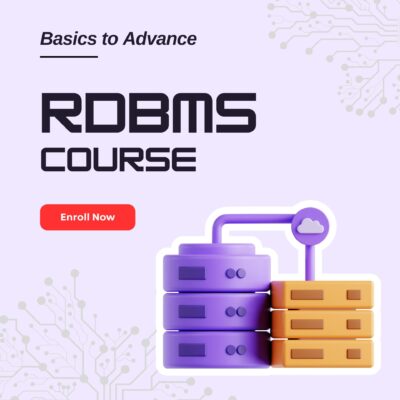Relational Database Management System (RDBMS) Course
Enroll Now & Start Your Programming Journey with Relational Database Management System (RDBMS) Course

Language: English
Certificate: Yes
Duration: 2 Months
Online/Offline Available
Our Student Placed in




About the Course
The RDBMS course at Orange ITech is designed to build strong foundations in database concepts, structure, and query optimization. In today’s data-driven world, understanding how to manage, query, and secure data efficiently is a must-have skill for every developer, analyst, and software professional.
This course gives you hands-on experience with real-world database tools like MySQL, Oracle, SQL Server, and PostgreSQL while covering essential topics such as ER modeling, SQL, joins, normalization, transactions, concurrency control, and database security.
Whether you’re a beginner or want to strengthen your backend development skills, this course will train you to design and manage scalable, secure, and efficient relational databases from scratch. With live project work, 200+ hours of practical learning, and 100% placement support, you’ll walk away confident and job-ready.
What You Will Learn in Relational Database Management System (RDBMS) Course
Introduction to RDBMS
Start with the foundations of databases and how RDBMS evolved.
Topics Covered:
What is a database and why it’s essential
DBMS vs RDBMS
Pros and cons of DBMS/RDBMS systems
Database models: Hierarchical, Network, Relational
Key terminologies: Tables, Tuples, Attributes, Keys, Relationships
Entity-Relationship (ER) Modeling
Learn how to design databases using ER concepts.
Topics Covered:
Understanding entities and attributes
Entity sets and relationship sets
Attribute types: Simple, Composite, Derived, Multivalued
Primary, Foreign, Candidate, and Super Keys
ER Diagrams and symbols
Converting ER diagrams into relational tables
Concepts: Generalization, Specialization, Aggregation
Relational Model & Relational Algebra
Explore the theoretical model behind relational databases.
Topics Covered:
Introduction to the relational model and schemas
Relational Algebra:
Select, Project, Join, Union, Intersection, Difference, Cartesian Product
Relational Calculus:
Tuple and Domain Relational Calculus
Structured Query Language (SQL)
Master SQL – the language of all relational databases.
Topics Covered:
Introduction to SQL and its categories:
DDL: CREATE, ALTER, DROP
DML: INSERT, UPDATE, DELETE
DQL: SELECT, WHERE, GROUP BY, HAVING, ORDER BY
DCL: GRANT, REVOKE
TCL: COMMIT, ROLLBACK, SAVEPOINT
Joins: INNER, LEFT, RIGHT, FULL OUTER
Subqueries and nested queries
Views and materialized views
Indexing for performance
Normalization & Data Design
Learn to design efficient databases by removing redundancy.
Topics Covered:
Purpose and need for normalization
Common anomalies: Insertion, Deletion, Update
Functional dependencies
Normal forms: 1NF, 2NF, 3NF, BCNF
Advanced normal forms (4NF, 5NF – optional)
De-normalization strategies
Transaction Management & Concurrency Control
Work hands-on with the most widely-used RDBMS systems.
Platforms Covered:
MySQL
SQL Server
Oracle
PostgreSQL
SQLite
Database Security & Integrity
Learn to design efficient databases by removing redundancy.
Topics Covered:
Purpose and need for normalization
Common anomalies: Insertion, Deletion, Update
Functional dependencies
Normal forms: 1NF, 2NF, 3NF, BCNF
Advanced normal forms (4NF, 5NF – optional)
De-normalization strategies
Tools & Platforms
Learn how to design databases using ER concepts.
Topics Covered:
Understanding entities and attributes
Entity sets and relationship sets
Attribute types: Simple, Composite, Derived, Multivalued
Primary, Foreign, Candidate, and Super Keys
ER Diagrams and symbols
Converting ER diagrams into relational tables
Concepts: Generalization, Specialization, Aggregation
Aptitude
Quantitative Aptitude
- Average
• Percentage
• Profit and Loss
• Simple Interest
• Compound Interest
• Ratio Proportion
• Time and Work
• Time
• Speed
• Distance Number
• System
• Permutation and Combination
• Probability
• Data Interpretation
Logical Reasoning
- Blood Relation
• Direction sense
• Coding and decoding• Clocks and Calendar• Cubes and Dices
• Seating arrangement
• Syllogism• Data sufficiency
• Puzzles
• Miscellaneous
Softskills
- Setting the tone
• Introduction of Be Employable
• Competency Matrix
• Effective Communication
• Presentation skills
• Business Communication
• Attitude + Motivation
• Emotional Intelligence
• Leadership
• Create CV/Resume
• Group Discussion
• Mock Group Discussion
• PI practice
• Virtual Interview
• Industry Knowhow and future, Certifications and
action plan
Projects
3 Projects
Apply heaps & priority queues for task scheduling.






FAQs
What is the duration of the RDBMS course at Orange ITech?
The RDBMS course runs for 2 months, including 200+ hours of training with practical labs, assignments, and real-time project implementation.
Is this course beginner-friendly?
Yes! The course is designed for absolute beginners. It starts from the basics of databases and gradually moves to advanced SQL and database management concepts.
Will I learn SQL in depth?
Yes. SQL is a major part of this course. You’ll cover DDL, DML, DQL, DCL, TCL, joins, subqueries, indexing, views, and more with hands-on practice in MySQL, PostgreSQL, and other RDBMS platforms.
What tools will I get hands-on experience with?
You’ll work with popular database platforms like:
MySQL
Oracle
SQL Server
PostgreSQL
SQLite
Will I get a certificate after completing the course?
Yes, you will receive a course completion certificate from Orange ITech, which is helpful for job applications and resume building.
Does this course include project work?
Absolutely! The course includes live projects and assignments to help you practice what you’ve learned and build a portfolio.
Who is the trainer for this course?
You’ll be trained by a senior industry expert with 12+ years of experience in backend development, database design, and SQL optimization.
What job roles can I apply for after this course?
You’ll be prepared for roles like:
Database Developer
SQL Programmer
Backend Developer
Data Analyst
Junior DBA (Database Administrator)

Earn a Master Certification in RDBMS (Relational Database Management System)
Get recognized for your expertise with a Master Certification in RDBMS (Relational Database Management System) This industry-recognized certificate validates your skills and makes you stand out in the job market.
